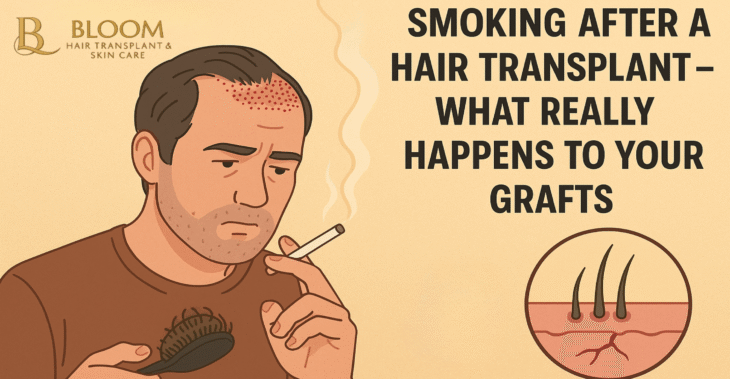
Smoking After a Hair Transplant – What Really Happens to Your Grafts
A hair transplant is a significant investment in your confidence and appearance. Whether you’ve chosen an FUE or FUT procedure, the success of your grafts depends on how well they heal in the days and weeks following surgery. But there’s one factor that can quietly undermine your results – smoking. If you’ve ever wondered “does smoking affect hair transplant results?” or “when can I start smoking after hair transplant?”, this guide by Bloom Hair Transplant Clinic in Andheri will explain everything you need to know.
The Science Behind Smoking and Hair Transplants
To understand why smoking after a hair transplant is harmful, you need to know how the healing process works. After surgery, each transplanted graft relies on oxygen-rich blood flow for survival. This blood brings the nutrients and oxygen necessary for new follicles to anchor themselves in the scalp and start producing healthy hair.
When you smoke, the chemicals in cigarettes – particularly nicotine, carbon monoxide, and hydrogen cyanide – cause vasoconstriction, meaning your blood vessels narrow and blood circulation decreases. The result? Less oxygen reaches your healing scalp.
So, does smoking affect hair transplant outcomes? Absolutely. Restricted blood flow makes it harder for grafts to “take root,” increasing the risk of graft failure and slowing overall recovery.
What Happens If You Smoke After a Hair Transplant
1. Poor Blood Circulation
Nicotine reduces oxygen delivery to tissues, meaning your transplanted follicles receive less nourishment. This can lead to weaker graft survival rates and patchy results.
2. Increased Risk of Infection
Smoking impairs the body’s immune response. After a hair transplant, even a small infection can affect multiple grafts. Patients who smoke often experience slower wound healing and a higher risk of post-surgical complications.
3. Delayed Healing and Scarring
The harmful toxins in cigarette smoke interfere with collagen formation – a key protein for wound repair. This not only slows recovery but can also cause visible scarring or uneven healing around the transplanted area.
4. Reduced Hair Growth Quality
Even if your grafts survive, smoking can still impact the quality of the new hair. Follicles may produce thinner, weaker, or slower-growing strands due to chronic oxygen deprivation.
5. Long-Term Hair Loss Risks
Smoking affects overall scalp health. Over time, it contributes to oxidative stress, hormonal imbalance, and microvascular damage, all of which accelerate natural hair thinning, even in non-transplanted areas.
When Can I Start Smoking After a Hair Transplant?
This is one of the most common questions asked by patients at Bloom Hair Transplant Clinic – and for good reason. The temptation to resume smoking can be strong, but patience is key to protecting your investment.
Doctors generally recommend avoiding smoking for at least 2–4 weeks before and after surgery. However, for optimal recovery, staying smoke-free for a minimum of one month post-transplant is strongly advised.
Why so long? Because during this time, your new grafts are forming vital connections with your scalp’s blood vessels. Introducing nicotine too soon can cause graft necrosis (death) or poor anchoring, leading to patchy and uneven results.
If quitting altogether feels difficult, try nicotine-free alternatives or gradual reduction methods well before your procedure.
Smoking and Hair Transplant – The Hidden Dangers of Passive Smoke
Even if you’re not directly smoking, passive exposure to cigarette smoke can still harm your recovery. The toxins in the air can irritate the scalp, delay healing, and cause inflammation. That’s why post-surgery patients are advised to avoid smoky environments entirely, especially during the first 10–14 days when grafts are at their most delicate stage.
What If You Smoked Before Your Hair Transplant?
If you’re a regular smoker planning a procedure, your doctor will likely ask you to quit at least 1–2 weeks before surgery. This helps improve blood flow and oxygenation, setting the stage for better graft survival.
Even if you’ve smoked for years, it’s never too late to stop. Quitting – even temporarily – before and after your transplant can significantly improve your healing and long-term results.
At Bloom Hair Transplant Clinic, specialists often counsel patients on pre- and post-operative care to ensure they’re fully prepared for the procedure. This includes personalised advice on managing smoking habits, diet, and lifestyle factors that influence hair restoration success.
The Long-Term Impact – Why Quitting Is Worth It
Beyond your immediate recovery, quitting smoking can have lasting benefits for your hair and overall health. Here’s why:
- Improved Scalp Circulation: Healthier blood flow means more nutrients and oxygen for your hair follicles.
- Better Collagen Production: Quitting enhances skin elasticity and reduces scarring.
- Stronger, Healthier Hair: Over time, reduced oxidative stress leads to thicker, shinier strands.
- Long-Term Results: Patients who stay smoke-free enjoy longer-lasting and more natural-looking transplants.
Tips to Stay Smoke-Free After Your Hair Transplant
- Replace the Habit: Use sugar-free mints or gum to combat cravings.
- Stay Hydrated: Water helps flush nicotine and toxins out of your system faster.
- Avoid Triggers: Stay away from environments where others smoke.
- Use Support Systems: Nicotine patches or smoking cessation programs can be effective if quitting cold turkey feels difficult.
- Remember Your Goal: Every time you think of lighting a cigarette, remind yourself of the new hairline you’ve worked so hard for.
Protecting Your Hair Transplant Results from Smoking
Smoking and hair transplant procedures simply don’t mix. While it may seem harmless to have a quick puff, the effects on your newly transplanted grafts can be long-lasting and detrimental. The answer to “does smoking affect hair transplant?” is a definite yes; it reduces graft survival, slows healing, and compromises your final results.
If you’ve recently undergone surgery or are planning one, give your grafts the best possible environment to thrive. Stay smoke-free for at least a month, follow post-care instructions closely, and trust the experts at Bloom Hair Transplant Clinic to guide you through your recovery.
Your hair – and your health – will thank you for it.

